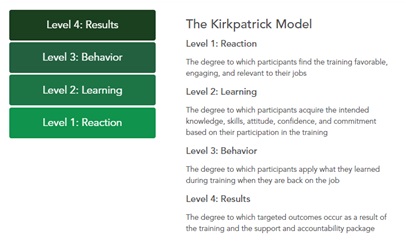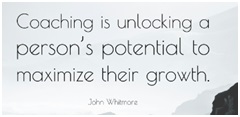A Research Paper By Barbara DeMatte, Business Coach, UNITED STATES

How to Coach the Individual to Use Available Tools and Resources to Become Developing Managers of People™.
The Dilemma
In business, Managers are most often promoted because they were super-duper employees making widgets, now they are the manager of a widget-making team. Most often, individuals are not promoted to managerial roles because they have the skills, talent, or ability to manage. Instead, there was a job opening and the best widget maker or the employee with the most tenure got the job.
This paper is not going to evaluate how individuals should be appraised on their ability to step into managerial roles. Instead, it will focus on how to coach the individual to use available tools and resources to become a better Manager of People™.
Over the past 30 years of delivering management training and working with managers, I have not found one new or seasoned manager, who would tell me that they were trained on how to be a Manager of People™ when they got the job. They tell me that they had to figure it out on their own. Many apply the lessons learned from managers they work(ed) for. They admit the techniques and approaches they are using are not working. They are not being held accountable for managing their team. They admit to being ineffective at managing people and often end up working alongside their staff to get the job done, to get the deliverable out the door. This is not managing people. This is doing others’ work.
Of the hundreds of managers I have met so far in my management training classes, no one:
- Could define the responsibilities of a Manager of People™
- Were trained to develop the necessary skills to be an effective manager
- Have been held accountable or evaluated on their managerial skills
- Can define the measurable deliverables that they are to be evaluated on with respect to managing people.
Instead, they are consistently reminded of the quality and quantity of widgets that needed to be delivered to the customer. So, they push, threaten and provoke employees to get the job done. This is not managing people.
The manager is set up for failure, and this is just not fair.
How to Become a Better Developing Managers of People™.
The Objective
Develop a coaching strategy that provides results.
Key Definitions
What Is the Definition of Coaching?
Partnering with clients in a thought-provoking and creative process inspires them to maximize their personal and professional potential. The process of coaching often unlocks previously untapped sources of imagination, productivity, and leadership. Source: International Coaching Federation
What Is the Definition of Strategy?
strat·e·gy/ˈstradəjē/noun
- a plan of action or policy designed to achieve a major or overall aim. Source: Oxford Languages
Strategies for business, life, and living all involve people. Often, individuals cannot develop and implement a strategy on their own. We all need others and we need others to be motivated, driven, and goal-oriented to work toward a common goal and implement our strategy.
What Is the Definition of ‘Manager’?
man·ag·er/ˈmanijər/noun
A person is responsible for controlling or administering all or part of a company or similar organization. Source: Oxford Languages
A person who appears to know how all tasks should be accomplished but can’t actually do any of those tasks themselves. Source: Urban Dictionary
A person responsible for controlling or administering all or part of a company or similar organizations
A person who controls the activities, business dealings, and other aspects of the career of an entertainer, athlete, group of musicians, etc. Source: Oxford Languages
A person has control or direction of an institution, business, etc., or a part, division, or phase of it.
A person who manages.A person who controls and manipulates resources and expenditures, of a household. Source: Dictionary.com
These definitions all seem to be definitions of managers of process. Nowhere do these renowned definitions reflect being Managers of People™, it seems assumed. And that is the problem in companies everywhere, there are too many assumptions and insufficient measurables of the ‘people’ aspect of managing. And yet, every company, in every industry, in any location, of any size, needs people in order to develop and deliver a product or service. In these and other definitions, managing ‘people’ is missing. And yet, companies continuously brag that their greatest assets are their ‘people’.
One of the better definitions of a manager is this:
Management is helping someone achieve more than they otherwise would on their own. The more people you can help, and the higher the achievement they attain, the better you are doing. Source: Phil Shawe, Contributor Co-CEO and co-founder of TransPerfect
Aha, now we are getting somewhere.
I suggest a further definition of a Manager of People™:
- Effective managers believe in each of their people and are able to help every single employee do their best.
- Effective managers of people motivate, inspire, coach, and lead each person on their team to achieve results.
How Do We Coach Individuals to Be Effective Managers of People™ to Execute the Strategy and Deliver Results?
- We teach
- We hold managers accountable
- We coach
1. We Teach
Managers often learn how to manage from the people they report to, who they previously worked for, or are told to read a management book. Managers think the best management book, the recent TED Talk, or the daily quote of the day will make them better managers. Many companies even provide training to managers on how to manage a department and companies believe a manager who simply attends a training class will result in a better manager.
In 2020, the average company in the U.S. spent $1,111 per employee on training costs.
- That’s $82.5 billion in total training expenditures.
- 44% of training was allocated for non-exempt employees, with customer service training being first in line.
- For all companies in the survey, there was an average of 55.5 hours of training provided to each employee. Source: Training Magazine’s 2020 Training Industry Report
Ok, so this is a start. This is also great news for the training industry.
- What’s the impact on employees performing better because of a manager who attended a training class(es)?
- What are the results?
- What is the Return on Investment for the $1,111 spent on each manager?

A valuable tool to evaluate the impact of training is the Kirkpatrick Model, The Standard for Leveraging and Validating Talent Investments™. This is a start.

Let’s focus on Level 3. Behavior is all about a manager having the belief in themselves and having the confidence and commitment to apply the skills learned. Most cannot do this on their own. Coaching is an opportunity to provide support to a manager to deliver on this ‘Level’.
2. We Hold Managers Accountable
Managers are not clear on the definition of ‘accountability’.
When a manager is asked who is accountable for each member of their team, the answer is often vague and lacks ownership. The correct response is ‘I am accountable’ because a manager is accountable for their own behaviors and the environment the manager creates around every employee. The objective is to enable and encourage each employee to work harder, smarter, and most efficiently.
When a manager is asked; ‘who is accountable for what was learned in training classes?’, the answer is often elusive. The better response is ‘I am accountable’ because the individual is accountable to apply what was learned, constantly and consistently. There is often no measurement or reinforcement of how the manager applies what was learned. The truth is that the concepts learned and practiced in training are lost within 48 hours because of the relentless demands of the job and the lack of follow-up from the manager’s manager. The training binder and materials are lost in an office or on a desk and not ‘seen’ anymore. There is no accountability to help the manager develop their skills in developing their people.
3. We Coach
Coaching adds value. A coach’s role is to support an individual in identifying the behaviors and thought patterns that will change a manager’s behavior. Coaching a manager to be truly accountable for their (KirkparickLevel3)behaviors in work, delivers reliable results. It is all in the accountability
 It is critical that applying Level 3 shows that the manager’s ‘knowledge, thinking, actions and being are aligned with their responsibilities’(Adapted from ICA Facilitating Growth Module).
It is critical that applying Level 3 shows that the manager’s ‘knowledge, thinking, actions and being are aligned with their responsibilities’(Adapted from ICA Facilitating Growth Module).
Daily, managers know exactly where they stand with respect to the results of the service or product that is delivered. This is reinforced weekly, monthly, quarterly, and annually. It is reinforced with bonuses, rewards, and recognition. At the same time, the feedback on their job performance as a manager is absent. And this is a mistake. An effective manager is accountable to be clear on their own performance metrics and have clarity on the deliverables. This includes the deliverable of being a Manager of People™.
A manager’s role has to be clearly defined with respect to managing people and achieving results. Managers should be clear on what they are measured on, specifically as it relates to their team. Managers should receive ongoing verbal and written evaluations of their job performance as a manager, because each day, a manager makes a difference in the people they work with. When a manager is not provided with these metrics, the manager is accountable to solicit this specific, measurable, and time-bound information.
 Coaching supports the manager to define and take action on the desired behaviors tied to measurable outcomes and results. This is when the manager can ‘maximize their personal and professional potential. Source: International Coaching Federation
Coaching supports the manager to define and take action on the desired behaviors tied to measurable outcomes and results. This is when the manager can ‘maximize their personal and professional potential. Source: International Coaching Federation
Managers are very clear on the specific behaviors of managers they have worked for and who they would never follow.
These same managers easily describe the behavior the managers would follow with more conviction because these are often the behaviors they want to emulate in themselves. Coaching helps managers define and prioritize the specific behaviors they want to show and own that shows them as a Manager of People. Coaching helps managers develop absolute clarity on their goals, and provides support so the manager can visualize and feel the emotion tied to the new behavior. This results in the manager committing to new habits and potentially life-changing behaviors that show their personal best. Coaching holds the manager accountable for consistently applying the commitment made to themselves.
The Coaching Strategy
The manager is to define clearly:
- how they specifically want to be described as a manager by each person on their team, by people who work around them, and by people who work with them
- the measurable behaviors they are to exhibit to support this description
- how they will be reminded to behave 100% of the time
This involves:
- Creating an affirmation about their daily workplace behaviors that are ‘seen’ every day. This can be a poster, quote, calendar reminder, mantra, or anything that works for that particular individual.
- Developing a routine to attain the daily affirmation that is realistic, attainable, and genuine
- Measuring and committing to behaviors daily
- Acknowledging and celebrating each of the days where the behaviors met the specific goals.
- Identifying each of the behaviors that were not met on any given day
- Understanding the ‘why’ and committing to an adjustment in behaviors
- Making these steps a habit
Coaching is providing support for the manager to recognize how they can:
- See and ‘be seen by every member of the team who works for and around them
- Release their positive or negative judgments about each member of their team which
- Listen more and listen better
- Be accountable, all of the time
Coaching and Developing Managers of People™.
Developing and nurturing managers through:
- Teaching
- Defining and holding accountability
- Coaching
Can result in higher levels of productivity and quality work, because, we have developed Managers of People™
References
Manager of People™ developed by Barbara DeMatteo
International Coaching Federation
Oxford Languages
Urban Dictionary
Dictionary.com
Phil Shawe, Contributor Co-CEO and co-founder of TransPerfect
Training Magazine’s 2020 Training Industry Report
Kirkpatrick Model, The Standard for Leveraging and Validating Talent Investments™